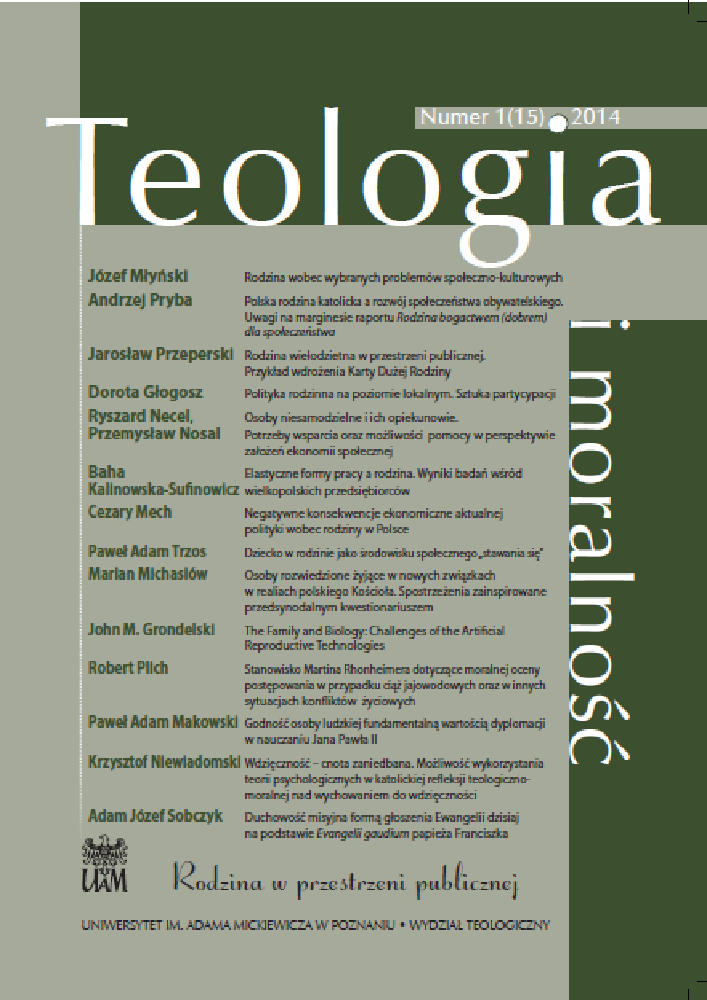Abstract
Looking at the panorama of the modern world, one can come to the conclusion that the man of the twenty-first century carries deep in his interior a serious identity crisis. Among the many reasons for this state of affairs, undoubtedly one of them is that man has forgotten about the role of conscience as a factor that regulates and points to the reality of Truth, to which man should form his life.
Recalling a reflection discussed among the Council Fathers gathered during Vaticanum II, it appears to be a valuable contribution to the contemporary debate over the identity of man, especially when it comes to the role of conscience and the duty of fidelity to its dictates. A significant contribution to the development of this conciliar concept of conscience is provided by a man, who specializes in literature, referred to as the Father of the Second Vatican Council, namely John Henry Newman. Newman, the invisibile peritus of the Second Vatican Council, which is also called Newman’s Council, is said by some commentators to have been raised to the dignity of Doctor of conscience. Unfortunately, the ideas contained in the teachings of the Cardinal, which found its fulfillment in the conciliar document Gaudium et spes, still have a problem breaking into the consciousness of the twenty-first century man.
This study tackles the question of the duty of fidelity to conscience in view of the teaching of John Henry Newman and Gaudium et spes. Its aim is to show a significant and identical line, which can be seen between the thoughts of the Cardinal and the teachings of the Council with regard to the discussed issues. In the age of the identity crisis of modern man, recalling the fundamental teaching of conscience seems to be a valuable voice in contemporary moral debate and an important indication for today's man.
References
Źródła podstawowe
Newman J.H., Historical sketches, III, London–New York–Bombay–Calcutta 1909.
Newman J.H., List do Księcia Norfolk o sumieniu, tłum. A. Muranty, Bydgoszcz 2002.
Newman J.H., Logika wiary, tłum. P. Boharczyk, Warszawa 1989.
Newman J.H., Surrender to God, w: Faith and prejudice and other unpublished sermons, ed. The Birmingham Oratory, New York 1956, s. 63-73.
Newman J.H., Via media, t. 1, London–New York–Bombay 1901.
Sobór Watykański II, Konstytucja duszpasterska o Kościele w świecie współczesnym Gaudium et spes, Rzym 1965. Tekst polski w: Sobór Watykański II, Konstytucje, dekrety, deklaracje, red. M. Przybył, Poznań 2002, s. 526-606.
Nauczanie Kościoła
Jan Paweł II, Encyklika o wartości i nienaruszalności życia ludzkiego Evangelium vitae, Rzym 1995. Tekst polski w: W trosce o życie. Wybrane dokumenty Stolicy Apostolskiej, red. K. Szczygieł, Tarnów 1998, s. 41-134.
Literatura przedmiotu i pomocnicza
Beaumont K., Newman as theologian and spiritual guide, w: John Henry Newman. Doctor of the Church, ed. P. Lefebvre, C. Mason, Oxford 2007, s. 27-56.
Bielawski K., Od redakcji, w: J.H. Newman, List do Księcia Norfolk o sumieniu, tłum. A. Muranty, Bydgoszcz 2002.
Chiavacci E., La nozione di persona nella „Gaudium et spes”, „Studia moralia” 24(1986), s. 93-114.
Chiavacci E., La teologia della „Gaudium et spes”, „Rassegna di teologia” 2(1985), s. 97-120.
Cross L., John Henry Newman. A Father of the Church?, „Newman Studies Journal” 3(2006), s. 5-11.
Dulles A., John Henry Newman, New York 20093.
Gałecki S., Spór o sumienie, Kraków 2012.
Geissler H., Conscience and truth in the writings of blessed John Henry Newman, Rome 2012.
Grave S.A., Conscience in Newman’s thought, Oxford 1989.
Hollis C., Newman a świat współczesny, tłum. T. Mieszkowski, Warszawa 1970.
Hughes G.J., Conscience, w: The Cambridge companion to John Henry Newman, ed. I. Ker, T. Merrigan, Cambrige 2009, s. 189-220.
Iglesias T., Newman on conscience and our culture, „Milltown Studies” 49(2002), s. 19-49.
Kasper W., L’uomo e la Chiesa nel mondo moderno. La costituzione pasorale “Gaudium et spes”, w: Fedeltà e rinnovamento. Il concilio Vaticano II 40 anni dopo, ed. B. Forte, Cinisello Balsamo 2005, s. 87-106.
Ker I., John Henry Newman: a biography, Oxford 2009.
Ker I., Newman and the fullness of Christianity, Edinburgh 1993.
Ker I., Newman on Vatican II, Oxford 2014.
Kostyło P., Newman John Henry, w: Religia. Encyklopedia PWN, red. T. Gadacz, B. Milerski, t. 7, Warszawa 2003.
Maiorano S., Coscienza e verità morale nel Vaticano II, w: La coscienza morale oggi, ed. M. Nalepa, T. Kennedy, Roma 1987, s. 259-278.
Morgan D., Newman, Doctor of conscience: Doctor of the Church?, w: John Henry Newman in his time, ed. P. Lefebvre,
C. Mason, Oxford 2007, s. 243-265.
Nagórny J., Wprowadzenie, w: Formacja moralna. Formacja sumienia, red. J. Nagórny, T. Zadykowicz, Lublin 2006, s. 9-12.
Ratzinger J., Prawda, wartości, władza, tłum. G. Sowiński, Kraków 1999.
Rencki J., Newman and Vatican II, w: John Henry Newman. Doctor of the Church, ed. P. Lefebvre, C. Mason, Oxford 2007, s. 188-203.
Schockenhoff E., Jaką pewność daje nam sumienie? Orientacja etyczna, tłum. A. Marcol, Opole 2006.
Surmiak W., Bł. Johna Henry’ego kard. Newmana (1801-1890) teologia sumienia, „Śląskie Studia Historyczno-Teologiczne” 44,2(2011), s. 511-528.
Terlinden L., Newman on conscience, w: John Henry Newman. Doctor of the Church, ed. P. Lefebvre, C. Mason, Oxford 2007, s. 201-219.
License
All rights reserved
